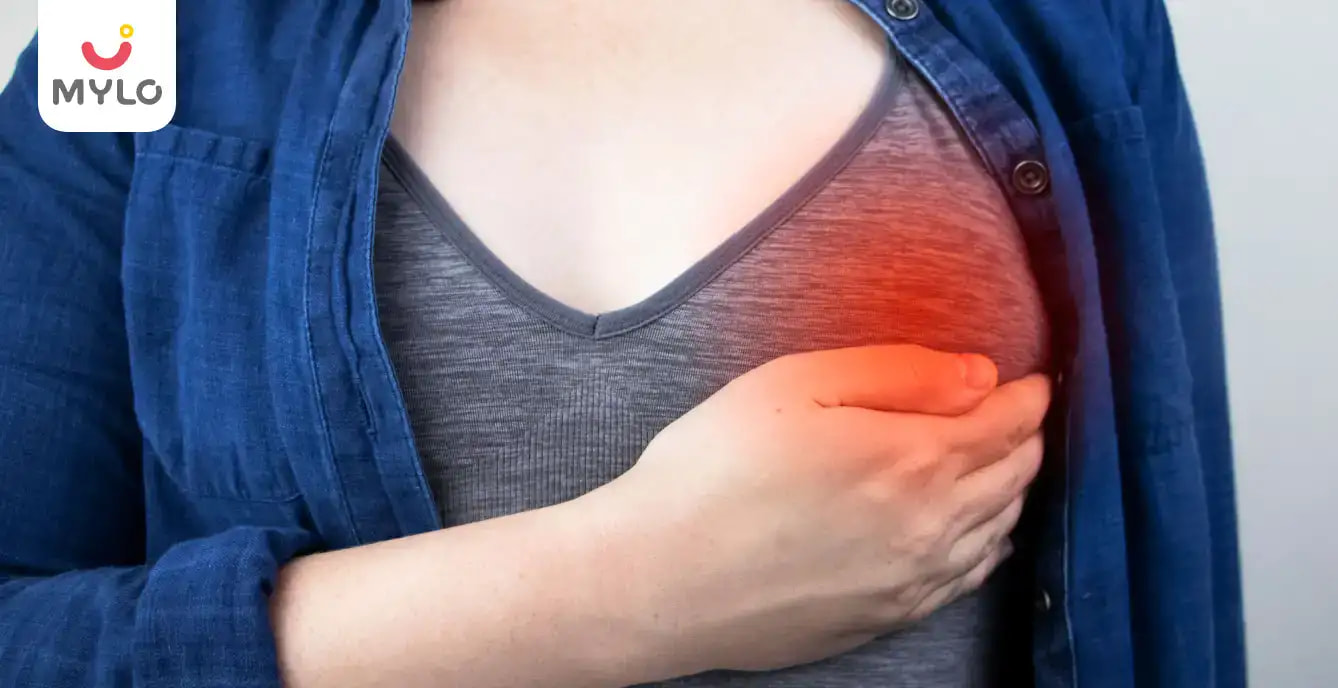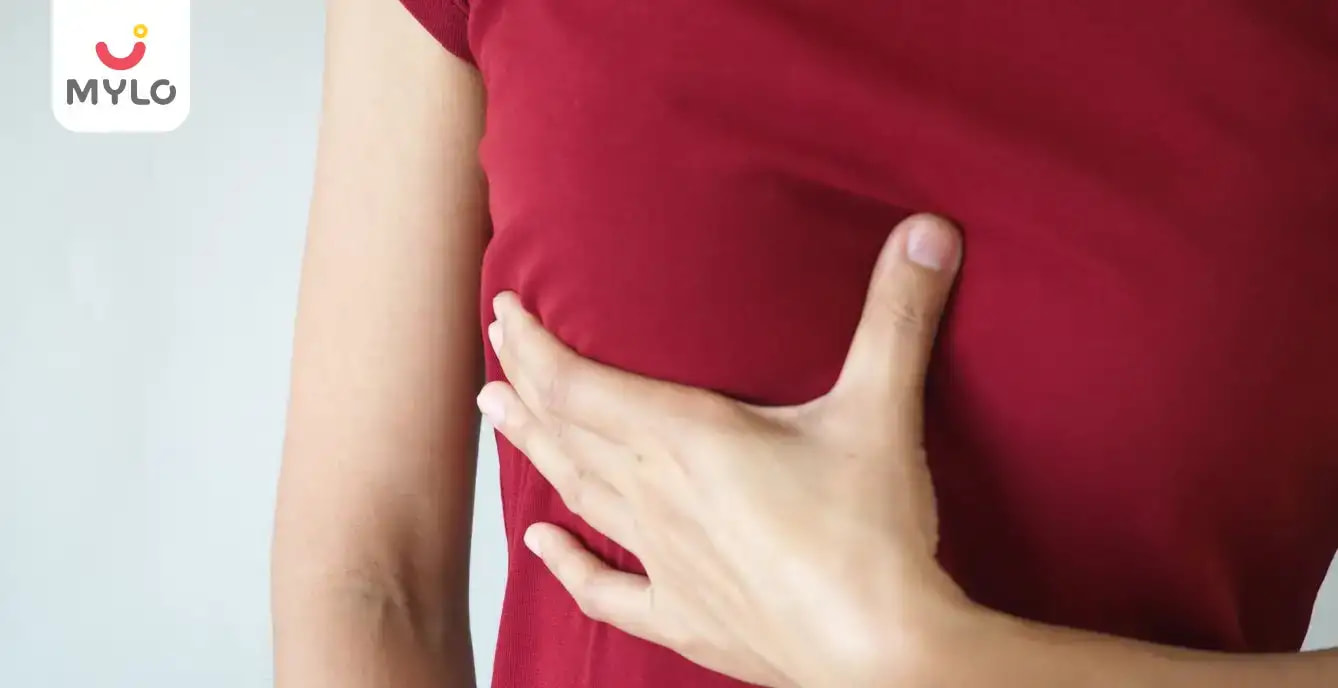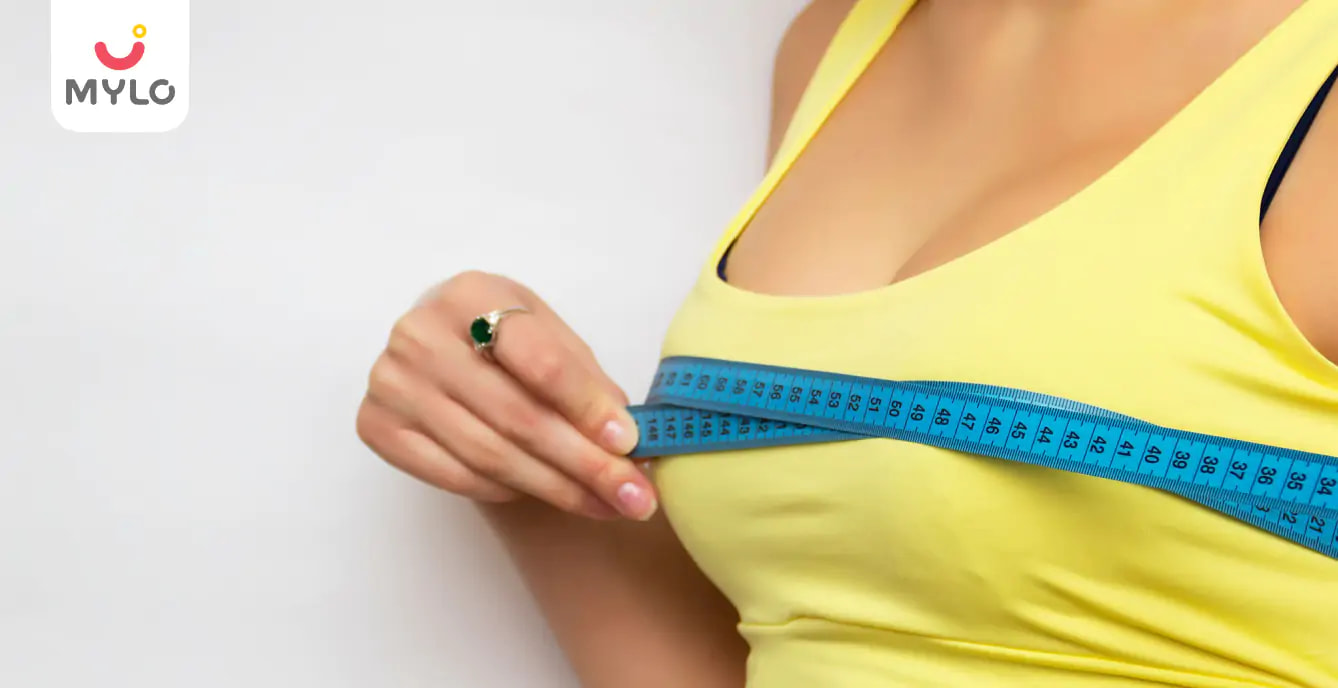Home

Breastfeeding & Lactation

What is Engorgement? Causes, Treatment & Symptoms
In this Article

Breastfeeding & Lactation
What is Engorgement? Causes, Treatment & Symptoms
Updated on 3 November 2023
After childbirth, many women experience breast engorgement. Breast engorgement is when a woman’s breasts swell up and become tender and sore due to a suddenly increased blood flow and milk supply to the breast tissue. It was believed to occur only in women who decide to breastfeed their babies. But in reality, one of the causes of breast engorgement is when a woman's body naturally starts to produce milk after childbirth.
Let us look at the causes, symptoms, and treatment for breast engorgement that affects hundreds of new mothers daily.
Causes of Breast Engorgement: When and why does it occur
Immediately after childbirth, a new mother’s body increases blood flow to the breast tissue. This increased blood flow stimulates milk production to feed the baby. But, sometimes, this process can cause tenderness and pain in the breasts and make the mother uncomfortable.
Generally, breast engorgement occurs with the start of milk production. Some women start to produce milk only three to five days post-partum, so breast engorgement postpartum also occurs in the first week or the second week after childbirth. But women who decide to breastfeed may experience breast engorgement at a later point as well.
While an engorged breast can happen without any particular reason, just due to an over-supply of blood and milk, there are some practices that are commonly associated with exacerbating this condition:
-
Women who have chosen not to breastfeed often do not realize that their milk supply will still come in the first few days after birth. They will have to express the breast milk if they do not want to experience breast engorgement.
-
In the initial stages of breastfeeding, some mothers struggle to get the baby to latch properly to the nipple and suck. They can visit a professional breastfeeding consultant for the management of breast engorgement and avoid complications like nipple engorgement.
-
When breastfeeding mothers miss feeding for a day, they can experience swollen and engorged breasts, which is very uncomfortable.
-
When mothers start supplementing breast milk with formula, their bodies take time to get used to the reduced milk supply requirement. This is one of the common causes of breast engorgement.
-
Breast engorgement prevention experts have found that nursing a sick child can lead to swollen and uncomfortable nipples for the mother.
-
If a mother tries to wean her child too quickly, it can lead to engorged tits.
Symptoms of breast engorgement: How to figure out if you have it
Breast engorgement symptoms vary for different patients. Some may experience it in only one breast, while others may experience it in both breasts. For some women, the symptoms of breast engorgement may spread even to the armpits.
-
Breast engorgement sometimes leads to the breast feeling tight and hard to the touch
-
Lumpy or swollen breasts can also be a symptom of breast engorgement and needs to be mentioned immediately to the doctor.
-
For some women, breast engorgement feels like the feeding breast is hard as a rock, and this can cause discomfort.
Common signs and symptoms of breast engorgement are mild fever and increased fatigue. Women can generally continue breastfeeding with this low ‘milk fever,' but it is best to consult a doctor as soon as possible. In some cases, the fever suggests more complicated breast-related complications. A more severe complication of breast engorgement is mastitis, an infection of the breast tissue caused by trapped milk.
It is best to have a doctor or a breastfeeding consultant on retainer during the first few months after childbirth so that mothers can immediately get a nursing care plan whenever they feel discomfort or engorgement of breast postpartum.
How to treat breast engorgement?
Breastfeeding mothers can use the following breast engorgement home remedies:
-
Use a warm compress to let the milk down.
-
Nurse at a regular schedule till the baby is full.
-
Alternate breasts during feeding time to avoid swelling up of one breast.
-
Mothers suffering from engorgement of the breast postpartum can also use a cold compress to gain relief. The cold is also useful for reducing the milk supply.
-
Hand pumps or breast pumps can be used for an excess milk supply that needs to be expressed.
-
Another preventive measure of breast engorgement is to slowly wean the child off of breast milk so that your body gets time to get used to the decreased demand.
Preventive measures of breast engorgement
Mothers who do not want to breastfeed will generally not experience complications of breast engorgement beyond a few days. Still, during the period of their symptoms of breast engorgement, they can take the following measures:
-
Use a cold compress for pain relief and to reduce milk supply.
-
Wear specially designed bras that will give full support to the breasts and prevent them from moving around too much.
Preventive measures and home remedies for breast engorgement are effective for some mothers. But it is best to get some doctor-approved treatment. Do not simply take any over-the-counter breast engorgement medicine, as it can negatively affect the quality of your breast milk.
You may like: https://mylofamily.com/article/how-to-prevent-breast-milk-leakage-during-pregnancy-170765?
Conclusion
Breastfeeding is a beautiful bonding experience between a mother and child but can have complications. A thorough "pump out" with an electric pump may occasionally be required to release the milk pressure if the engorgement does not improve. Do your research on the management of breast engorgement and read more such articles on the prevention of breast engorgement. Visit the Mylo store for baby and mother care products.



Written by
Mittali Khurana
Mittali is a content writer by profession. She is a dynamic writer with 04+ years of experience in content writing for E-commerce, Parenting App & Websites, SEO.
Read MoreGet baby's diet chart, and growth tips

Related Articles
Related Topics
RECENTLY PUBLISHED ARTICLES
our most recent articles

Diet & Nutrition
গর্ভাবস্থায় আলুবোখরা: উপকারিতা ও ঝুঁকি | Prunes During Pregnancy: Benefits & Risks in Bengali

Diet & Nutrition
গর্ভাবস্থায় হিং | ঝুঁকি, সুবিধা এবং অন্যান্য চিকিৎসা | Hing During Pregnancy | Risks, Benefits & Other Treatments in Bengali

Women Specific Issues
স্তনের উপর সাদা দাগ: লক্ষণ, কারণ এবং চিকিৎসা | White Spots on Nipple: Causes, Symptoms, and Treatments in Bengali

Diet & Nutrition
গর্ভাবস্থায় পোহা: উপকারিতা, ধরণ এবং রেসিপি | Poha During Pregnancy: Benefits, Types & Recipes in Bengali

Diet & Nutrition
গর্ভাবস্থায় মাছ: উপকারিতা এবং ঝুঁকি | Fish In Pregnancy: Benefits and Risks in Bengali

Diet & Nutrition
গর্ভাবস্থায় রেড ওয়াইন: পার্শ্ব প্রতিক্রিয়া এবং নির্দেশিকা | Red Wine During Pregnancy: Side Effects & Guidelines in Bengali
- ইনার থাই চ্যাফিং: কারণ, উপসর্গ এবং চিকিৎসা | Inner Thigh Chafing: Causes, Symptoms & Treatment in Bengali
- গর্ভাবস্থায় ব্রাউন রাইস: উপকারিতা ও সতর্কতা | Brown Rice During Pregnancy: Benefits & Precautions in Bengali
- Velamentous Cord Insertion - Precautions, Results & Safety
- Unlock the Secret to Flawless Skin: 7 Must-Have Qualities in a Face Serum
- Unlock the Secret to Radiant Skin: How Vitamin C Serum Can Transform Your Complexion
- Gender No Bar: 10 Reasons Why Everyone Needs a Body Lotion
- Unlock the Secret to Radiant Skin How to Choose the Perfect Body Lotion for Your Skin Type
- Top 10 Reasons to Apply a Body Lotion After Every Bath
- Communication in Toddlers: Milestones & Activities
- How to Improve Vocabulary for Toddlers?
- A Comprehensive Guide to Understanding Placenta Accreta
- Vulvovaginitis in Toddlers Causes, Symptoms and Treatment
- A Comprehensive Guide to Understanding Cerebral Palsy in Children
- Bitter Taste in Mouth During Pregnancy: Understanding the Causes and Remedies


AWARDS AND RECOGNITION

Mylo wins Forbes D2C Disruptor award

Mylo wins The Economic Times Promising Brands 2022
AS SEEN IN

- Mylo Care: Effective and science-backed personal care and wellness solutions for a joyful you.
- Mylo Baby: Science-backed, gentle and effective personal care & hygiene range for your little one.
- Mylo Community: Trusted and empathetic community of 10mn+ parents and experts.
Product Categories
Baby Carrier | Baby Soap | Baby Wipes | Stretch Marks Cream | Baby Cream | Baby Shampoo | Baby Massage Oil | Baby Hair Oil | Stretch Marks Oil | Baby Body Wash | Baby Powder | Baby Lotion | Diaper Rash Cream | Newborn Diapers | Teether | Baby Kajal | Baby Diapers Pants | Cloth Diapers | Laundry Detergent | Lactation Granules |







